MBS 518, Semester 1: Case Study on Car Sale Agreement Duties
VerifiedAdded on 2023/01/20
|6
|1468
|35
Case Study
AI Summary
This case study analyzes a car sale agreement dispute between Camita and Matthew, focusing on the duties of disclosure, fraud, and the legal obligations of both the seller and the buyer. The case examines whether the seller, Camita, was legally obligated to disclose a prior accident history of the car to the buyer, Matthew, and the implications of not doing so. It explores the concept of misrepresentation and fraud in the context of the sale, highlighting how the seller's failure to disclose the accident and subsequent false statements regarding the vehicle's history constitute a misrepresentation. The analysis references relevant legal principles, including consumer protection acts and common law, to determine the responsibilities of each party involved. Furthermore, the case study delves into the duty of the buyer to inspect the vehicle before purchase and the consequences of failing to do so. The conclusion emphasizes the importance of honesty in used car sales and the potential legal ramifications of misrepresenting information about a vehicle's condition, ultimately determining the potential legal outcomes of the situation.
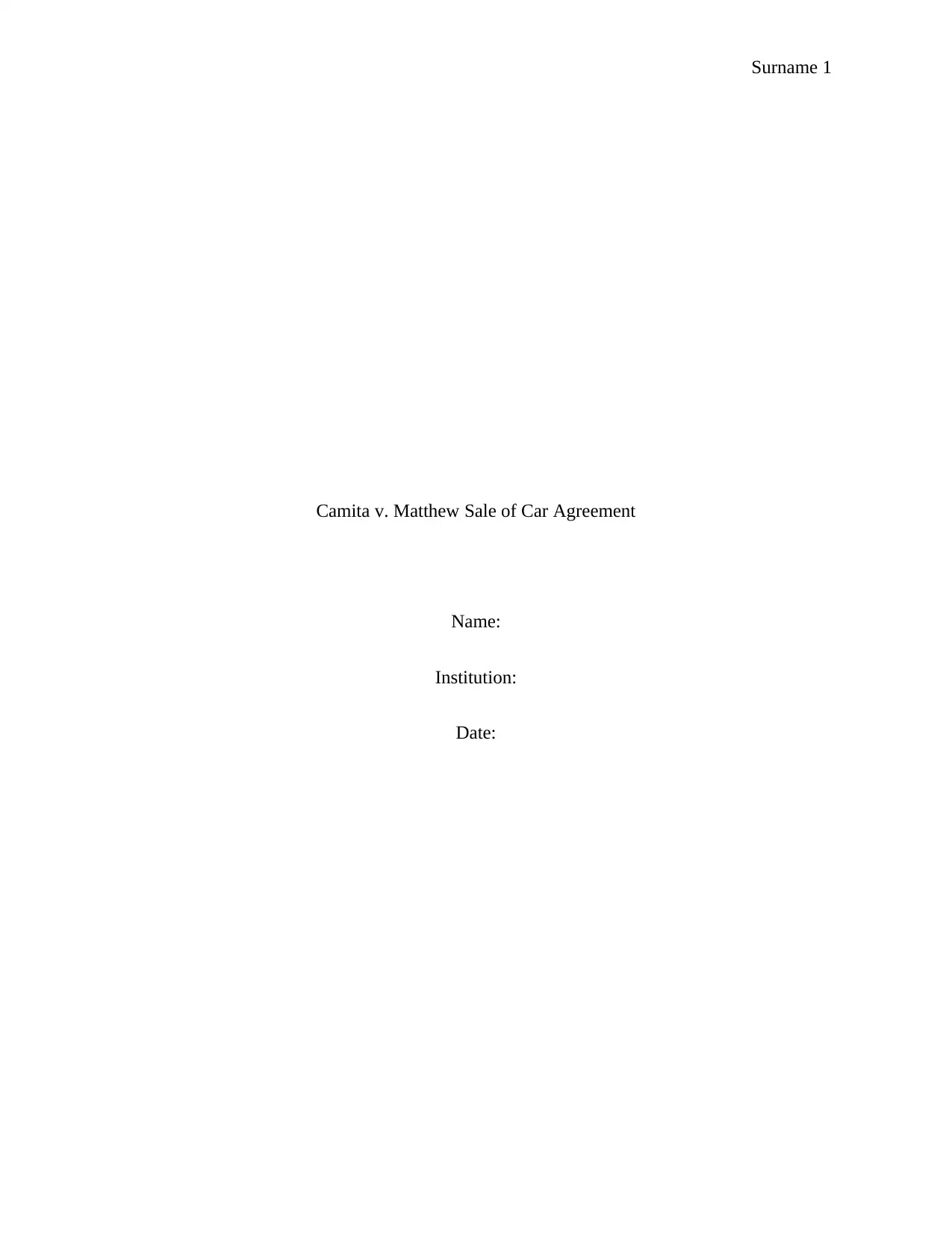
Surname 1
Camita v. Matthew Sale of Car Agreement
Name:
Institution:
Date:
Camita v. Matthew Sale of Car Agreement
Name:
Institution:
Date:
Paraphrase This Document
Need a fresh take? Get an instant paraphrase of this document with our AI Paraphraser
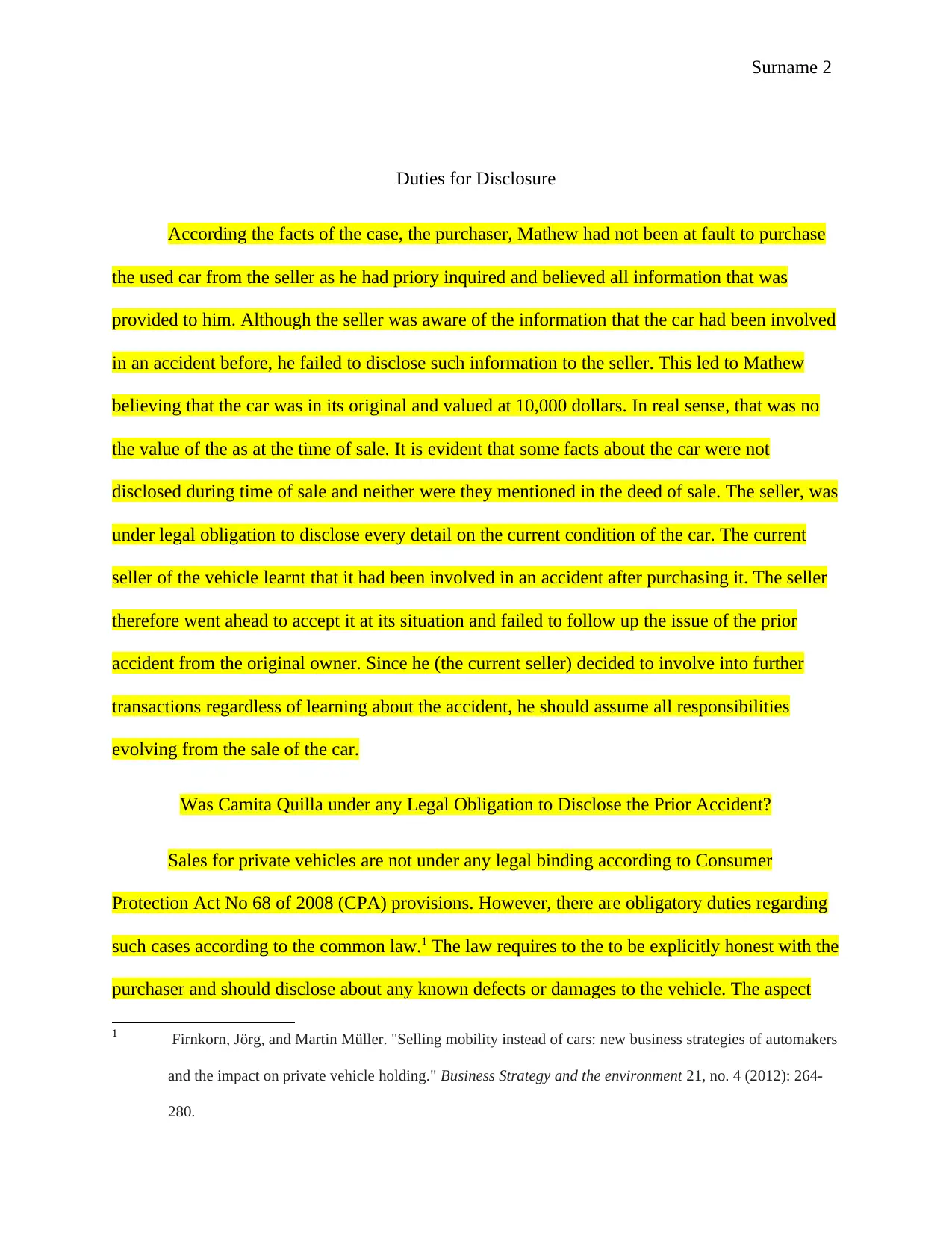
Surname 2
Duties for Disclosure
According the facts of the case, the purchaser, Mathew had not been at fault to purchase
the used car from the seller as he had priory inquired and believed all information that was
provided to him. Although the seller was aware of the information that the car had been involved
in an accident before, he failed to disclose such information to the seller. This led to Mathew
believing that the car was in its original and valued at 10,000 dollars. In real sense, that was no
the value of the as at the time of sale. It is evident that some facts about the car were not
disclosed during time of sale and neither were they mentioned in the deed of sale. The seller, was
under legal obligation to disclose every detail on the current condition of the car. The current
seller of the vehicle learnt that it had been involved in an accident after purchasing it. The seller
therefore went ahead to accept it at its situation and failed to follow up the issue of the prior
accident from the original owner. Since he (the current seller) decided to involve into further
transactions regardless of learning about the accident, he should assume all responsibilities
evolving from the sale of the car.
Was Camita Quilla under any Legal Obligation to Disclose the Prior Accident?
Sales for private vehicles are not under any legal binding according to Consumer
Protection Act No 68 of 2008 (CPA) provisions. However, there are obligatory duties regarding
such cases according to the common law.1 The law requires to the to be explicitly honest with the
purchaser and should disclose about any known defects or damages to the vehicle. The aspect
1 Firnkorn, Jörg, and Martin Müller. "Selling mobility instead of cars: new business strategies of automakers
and the impact on private vehicle holding." Business Strategy and the environment 21, no. 4 (2012): 264-
280.
Duties for Disclosure
According the facts of the case, the purchaser, Mathew had not been at fault to purchase
the used car from the seller as he had priory inquired and believed all information that was
provided to him. Although the seller was aware of the information that the car had been involved
in an accident before, he failed to disclose such information to the seller. This led to Mathew
believing that the car was in its original and valued at 10,000 dollars. In real sense, that was no
the value of the as at the time of sale. It is evident that some facts about the car were not
disclosed during time of sale and neither were they mentioned in the deed of sale. The seller, was
under legal obligation to disclose every detail on the current condition of the car. The current
seller of the vehicle learnt that it had been involved in an accident after purchasing it. The seller
therefore went ahead to accept it at its situation and failed to follow up the issue of the prior
accident from the original owner. Since he (the current seller) decided to involve into further
transactions regardless of learning about the accident, he should assume all responsibilities
evolving from the sale of the car.
Was Camita Quilla under any Legal Obligation to Disclose the Prior Accident?
Sales for private vehicles are not under any legal binding according to Consumer
Protection Act No 68 of 2008 (CPA) provisions. However, there are obligatory duties regarding
such cases according to the common law.1 The law requires to the to be explicitly honest with the
purchaser and should disclose about any known defects or damages to the vehicle. The aspect
1 Firnkorn, Jörg, and Martin Müller. "Selling mobility instead of cars: new business strategies of automakers
and the impact on private vehicle holding." Business Strategy and the environment 21, no. 4 (2012): 264-
280.
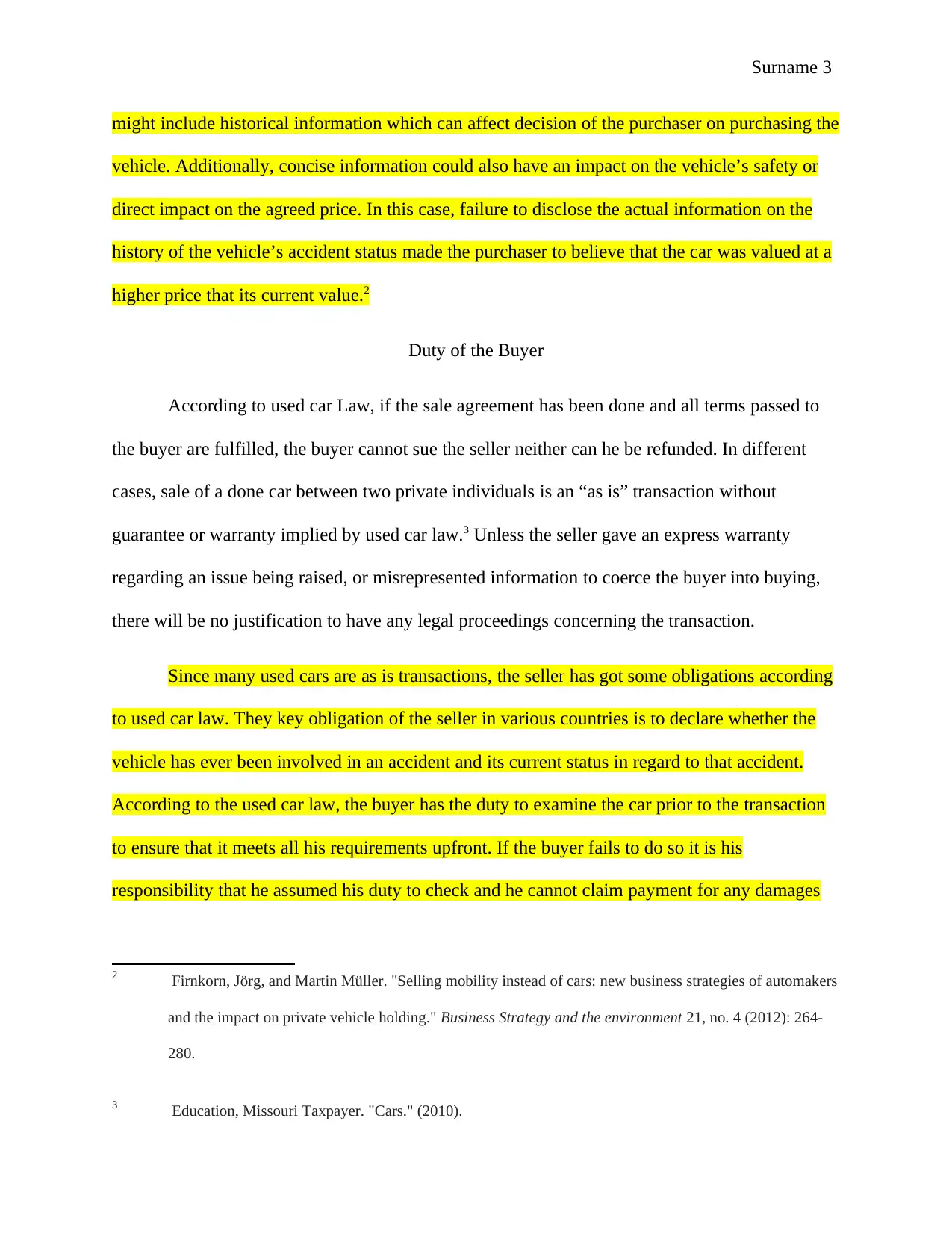
Surname 3
might include historical information which can affect decision of the purchaser on purchasing the
vehicle. Additionally, concise information could also have an impact on the vehicle’s safety or
direct impact on the agreed price. In this case, failure to disclose the actual information on the
history of the vehicle’s accident status made the purchaser to believe that the car was valued at a
higher price that its current value.2
Duty of the Buyer
According to used car Law, if the sale agreement has been done and all terms passed to
the buyer are fulfilled, the buyer cannot sue the seller neither can he be refunded. In different
cases, sale of a done car between two private individuals is an “as is” transaction without
guarantee or warranty implied by used car law.3 Unless the seller gave an express warranty
regarding an issue being raised, or misrepresented information to coerce the buyer into buying,
there will be no justification to have any legal proceedings concerning the transaction.
Since many used cars are as is transactions, the seller has got some obligations according
to used car law. They key obligation of the seller in various countries is to declare whether the
vehicle has ever been involved in an accident and its current status in regard to that accident.
According to the used car law, the buyer has the duty to examine the car prior to the transaction
to ensure that it meets all his requirements upfront. If the buyer fails to do so it is his
responsibility that he assumed his duty to check and he cannot claim payment for any damages
2 Firnkorn, Jörg, and Martin Müller. "Selling mobility instead of cars: new business strategies of automakers
and the impact on private vehicle holding." Business Strategy and the environment 21, no. 4 (2012): 264-
280.
3 Education, Missouri Taxpayer. "Cars." (2010).
might include historical information which can affect decision of the purchaser on purchasing the
vehicle. Additionally, concise information could also have an impact on the vehicle’s safety or
direct impact on the agreed price. In this case, failure to disclose the actual information on the
history of the vehicle’s accident status made the purchaser to believe that the car was valued at a
higher price that its current value.2
Duty of the Buyer
According to used car Law, if the sale agreement has been done and all terms passed to
the buyer are fulfilled, the buyer cannot sue the seller neither can he be refunded. In different
cases, sale of a done car between two private individuals is an “as is” transaction without
guarantee or warranty implied by used car law.3 Unless the seller gave an express warranty
regarding an issue being raised, or misrepresented information to coerce the buyer into buying,
there will be no justification to have any legal proceedings concerning the transaction.
Since many used cars are as is transactions, the seller has got some obligations according
to used car law. They key obligation of the seller in various countries is to declare whether the
vehicle has ever been involved in an accident and its current status in regard to that accident.
According to the used car law, the buyer has the duty to examine the car prior to the transaction
to ensure that it meets all his requirements upfront. If the buyer fails to do so it is his
responsibility that he assumed his duty to check and he cannot claim payment for any damages
2 Firnkorn, Jörg, and Martin Müller. "Selling mobility instead of cars: new business strategies of automakers
and the impact on private vehicle holding." Business Strategy and the environment 21, no. 4 (2012): 264-
280.
3 Education, Missouri Taxpayer. "Cars." (2010).
⊘ This is a preview!⊘
Do you want full access?
Subscribe today to unlock all pages.

Trusted by 1+ million students worldwide
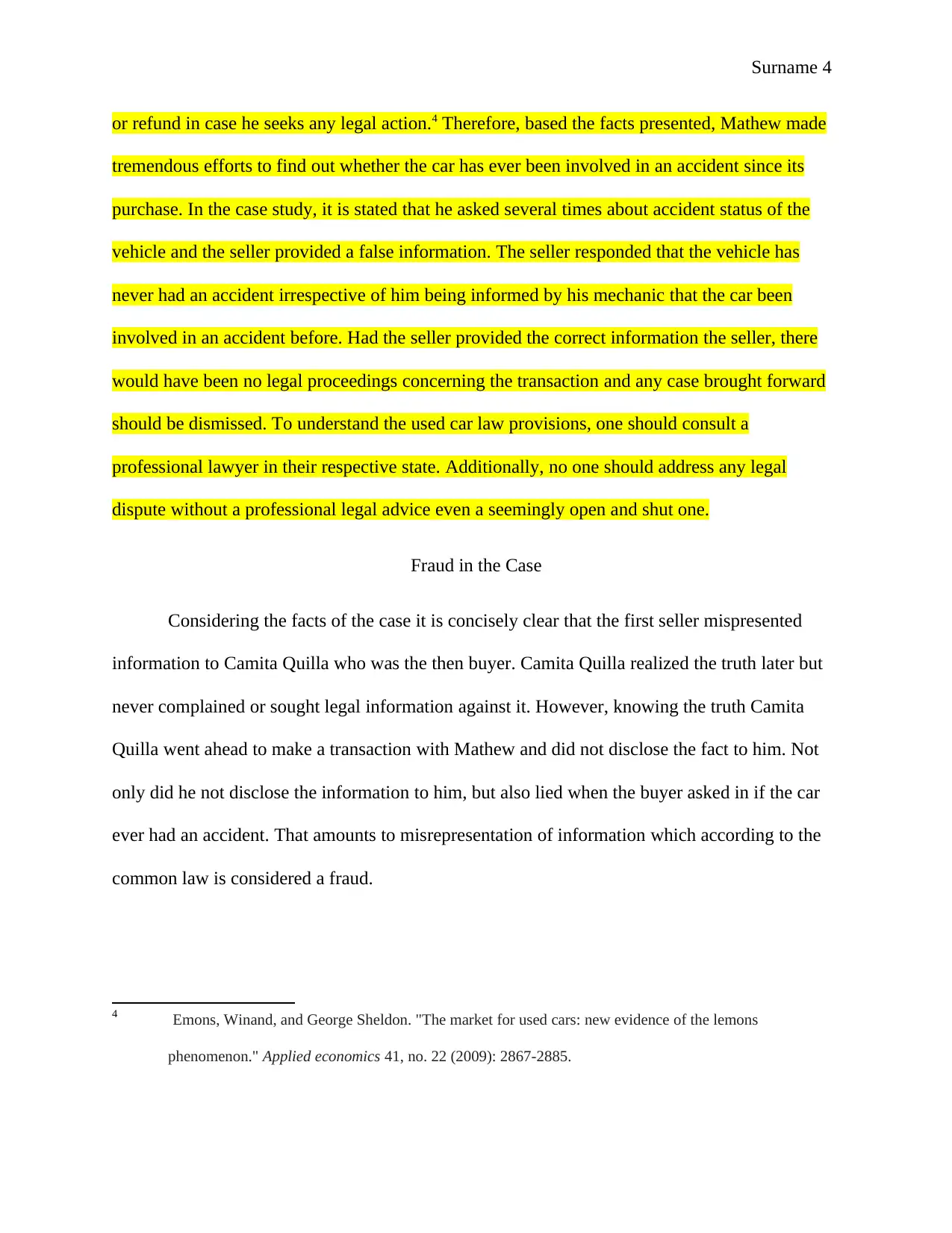
Surname 4
or refund in case he seeks any legal action.4 Therefore, based the facts presented, Mathew made
tremendous efforts to find out whether the car has ever been involved in an accident since its
purchase. In the case study, it is stated that he asked several times about accident status of the
vehicle and the seller provided a false information. The seller responded that the vehicle has
never had an accident irrespective of him being informed by his mechanic that the car been
involved in an accident before. Had the seller provided the correct information the seller, there
would have been no legal proceedings concerning the transaction and any case brought forward
should be dismissed. To understand the used car law provisions, one should consult a
professional lawyer in their respective state. Additionally, no one should address any legal
dispute without a professional legal advice even a seemingly open and shut one.
Fraud in the Case
Considering the facts of the case it is concisely clear that the first seller mispresented
information to Camita Quilla who was the then buyer. Camita Quilla realized the truth later but
never complained or sought legal information against it. However, knowing the truth Camita
Quilla went ahead to make a transaction with Mathew and did not disclose the fact to him. Not
only did he not disclose the information to him, but also lied when the buyer asked in if the car
ever had an accident. That amounts to misrepresentation of information which according to the
common law is considered a fraud.
4 Emons, Winand, and George Sheldon. "The market for used cars: new evidence of the lemons
phenomenon." Applied economics 41, no. 22 (2009): 2867-2885.
or refund in case he seeks any legal action.4 Therefore, based the facts presented, Mathew made
tremendous efforts to find out whether the car has ever been involved in an accident since its
purchase. In the case study, it is stated that he asked several times about accident status of the
vehicle and the seller provided a false information. The seller responded that the vehicle has
never had an accident irrespective of him being informed by his mechanic that the car been
involved in an accident before. Had the seller provided the correct information the seller, there
would have been no legal proceedings concerning the transaction and any case brought forward
should be dismissed. To understand the used car law provisions, one should consult a
professional lawyer in their respective state. Additionally, no one should address any legal
dispute without a professional legal advice even a seemingly open and shut one.
Fraud in the Case
Considering the facts of the case it is concisely clear that the first seller mispresented
information to Camita Quilla who was the then buyer. Camita Quilla realized the truth later but
never complained or sought legal information against it. However, knowing the truth Camita
Quilla went ahead to make a transaction with Mathew and did not disclose the fact to him. Not
only did he not disclose the information to him, but also lied when the buyer asked in if the car
ever had an accident. That amounts to misrepresentation of information which according to the
common law is considered a fraud.
4 Emons, Winand, and George Sheldon. "The market for used cars: new evidence of the lemons
phenomenon." Applied economics 41, no. 22 (2009): 2867-2885.
Paraphrase This Document
Need a fresh take? Get an instant paraphrase of this document with our AI Paraphraser
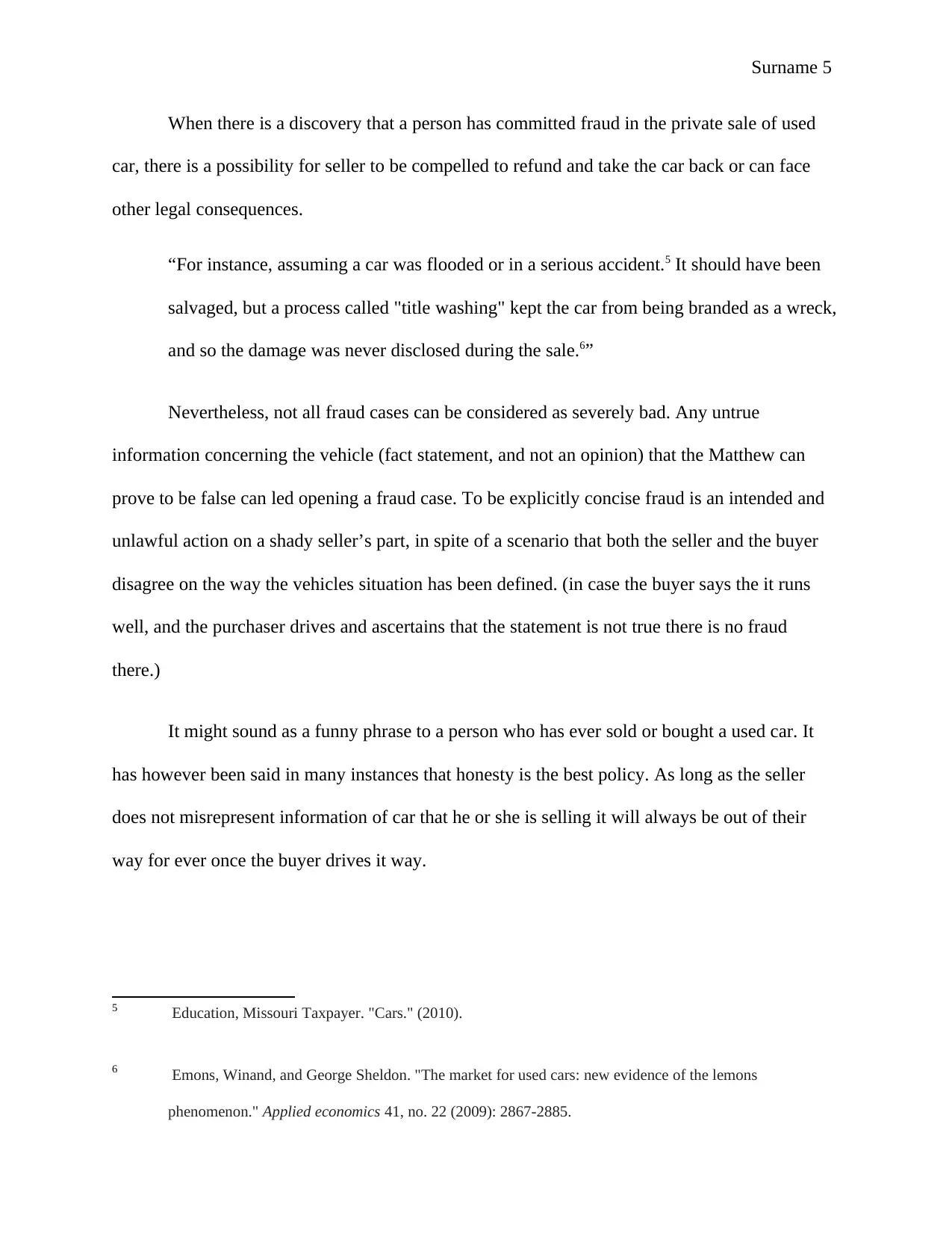
Surname 5
When there is a discovery that a person has committed fraud in the private sale of used
car, there is a possibility for seller to be compelled to refund and take the car back or can face
other legal consequences.
“For instance, assuming a car was flooded or in a serious accident.5 It should have been
salvaged, but a process called "title washing" kept the car from being branded as a wreck,
and so the damage was never disclosed during the sale.6”
Nevertheless, not all fraud cases can be considered as severely bad. Any untrue
information concerning the vehicle (fact statement, and not an opinion) that the Matthew can
prove to be false can led opening a fraud case. To be explicitly concise fraud is an intended and
unlawful action on a shady seller’s part, in spite of a scenario that both the seller and the buyer
disagree on the way the vehicles situation has been defined. (in case the buyer says the it runs
well, and the purchaser drives and ascertains that the statement is not true there is no fraud
there.)
It might sound as a funny phrase to a person who has ever sold or bought a used car. It
has however been said in many instances that honesty is the best policy. As long as the seller
does not misrepresent information of car that he or she is selling it will always be out of their
way for ever once the buyer drives it way.
5 Education, Missouri Taxpayer. "Cars." (2010).
6 Emons, Winand, and George Sheldon. "The market for used cars: new evidence of the lemons
phenomenon." Applied economics 41, no. 22 (2009): 2867-2885.
When there is a discovery that a person has committed fraud in the private sale of used
car, there is a possibility for seller to be compelled to refund and take the car back or can face
other legal consequences.
“For instance, assuming a car was flooded or in a serious accident.5 It should have been
salvaged, but a process called "title washing" kept the car from being branded as a wreck,
and so the damage was never disclosed during the sale.6”
Nevertheless, not all fraud cases can be considered as severely bad. Any untrue
information concerning the vehicle (fact statement, and not an opinion) that the Matthew can
prove to be false can led opening a fraud case. To be explicitly concise fraud is an intended and
unlawful action on a shady seller’s part, in spite of a scenario that both the seller and the buyer
disagree on the way the vehicles situation has been defined. (in case the buyer says the it runs
well, and the purchaser drives and ascertains that the statement is not true there is no fraud
there.)
It might sound as a funny phrase to a person who has ever sold or bought a used car. It
has however been said in many instances that honesty is the best policy. As long as the seller
does not misrepresent information of car that he or she is selling it will always be out of their
way for ever once the buyer drives it way.
5 Education, Missouri Taxpayer. "Cars." (2010).
6 Emons, Winand, and George Sheldon. "The market for used cars: new evidence of the lemons
phenomenon." Applied economics 41, no. 22 (2009): 2867-2885.
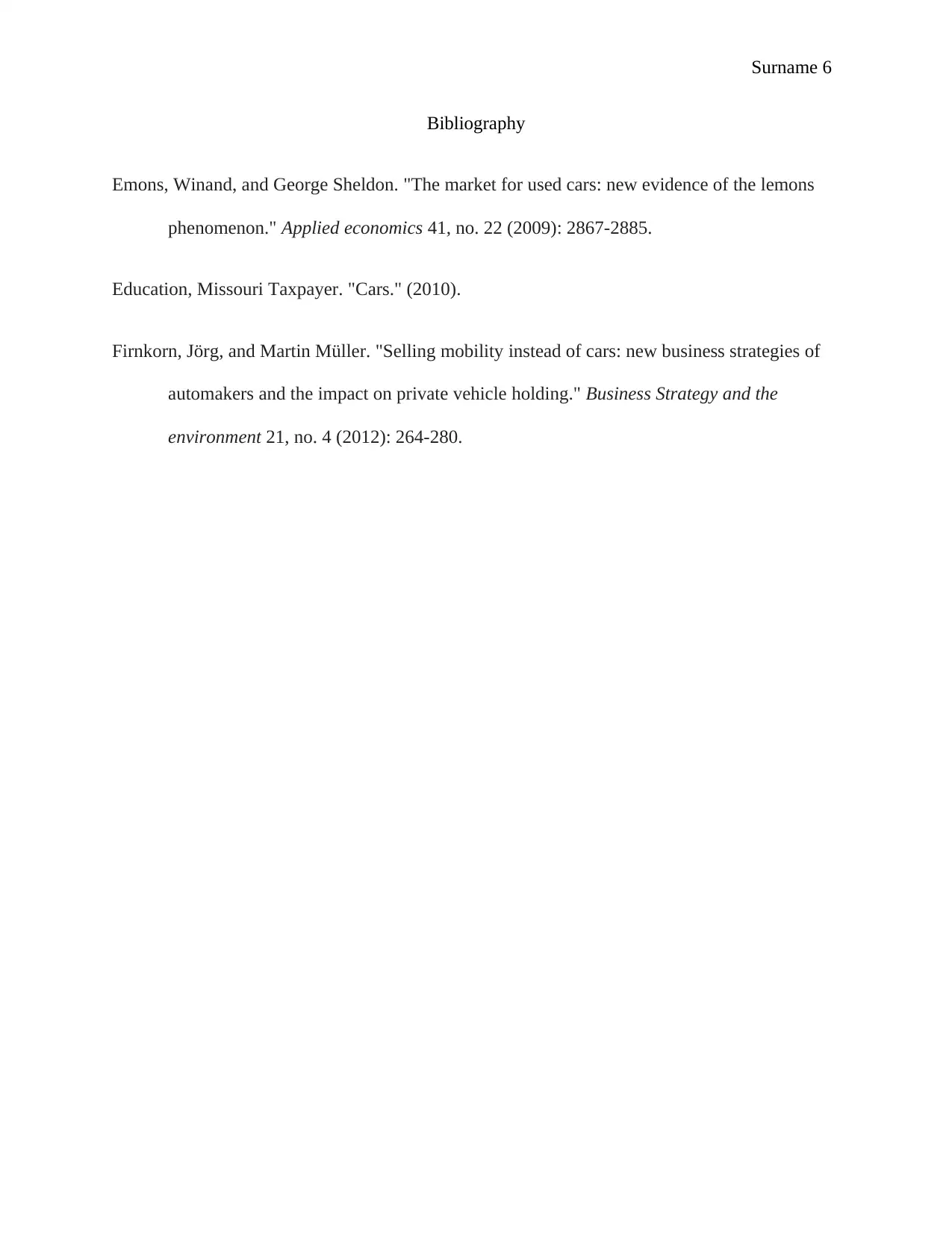
Surname 6
Bibliography
Emons, Winand, and George Sheldon. "The market for used cars: new evidence of the lemons
phenomenon." Applied economics 41, no. 22 (2009): 2867-2885.
Education, Missouri Taxpayer. "Cars." (2010).
Firnkorn, Jörg, and Martin Müller. "Selling mobility instead of cars: new business strategies of
automakers and the impact on private vehicle holding." Business Strategy and the
environment 21, no. 4 (2012): 264-280.
Bibliography
Emons, Winand, and George Sheldon. "The market for used cars: new evidence of the lemons
phenomenon." Applied economics 41, no. 22 (2009): 2867-2885.
Education, Missouri Taxpayer. "Cars." (2010).
Firnkorn, Jörg, and Martin Müller. "Selling mobility instead of cars: new business strategies of
automakers and the impact on private vehicle holding." Business Strategy and the
environment 21, no. 4 (2012): 264-280.
⊘ This is a preview!⊘
Do you want full access?
Subscribe today to unlock all pages.

Trusted by 1+ million students worldwide
1 out of 6
Related Documents
Your All-in-One AI-Powered Toolkit for Academic Success.
+13062052269
info@desklib.com
Available 24*7 on WhatsApp / Email
![[object Object]](/_next/static/media/star-bottom.7253800d.svg)
Unlock your academic potential
Copyright © 2020–2025 A2Z Services. All Rights Reserved. Developed and managed by ZUCOL.





